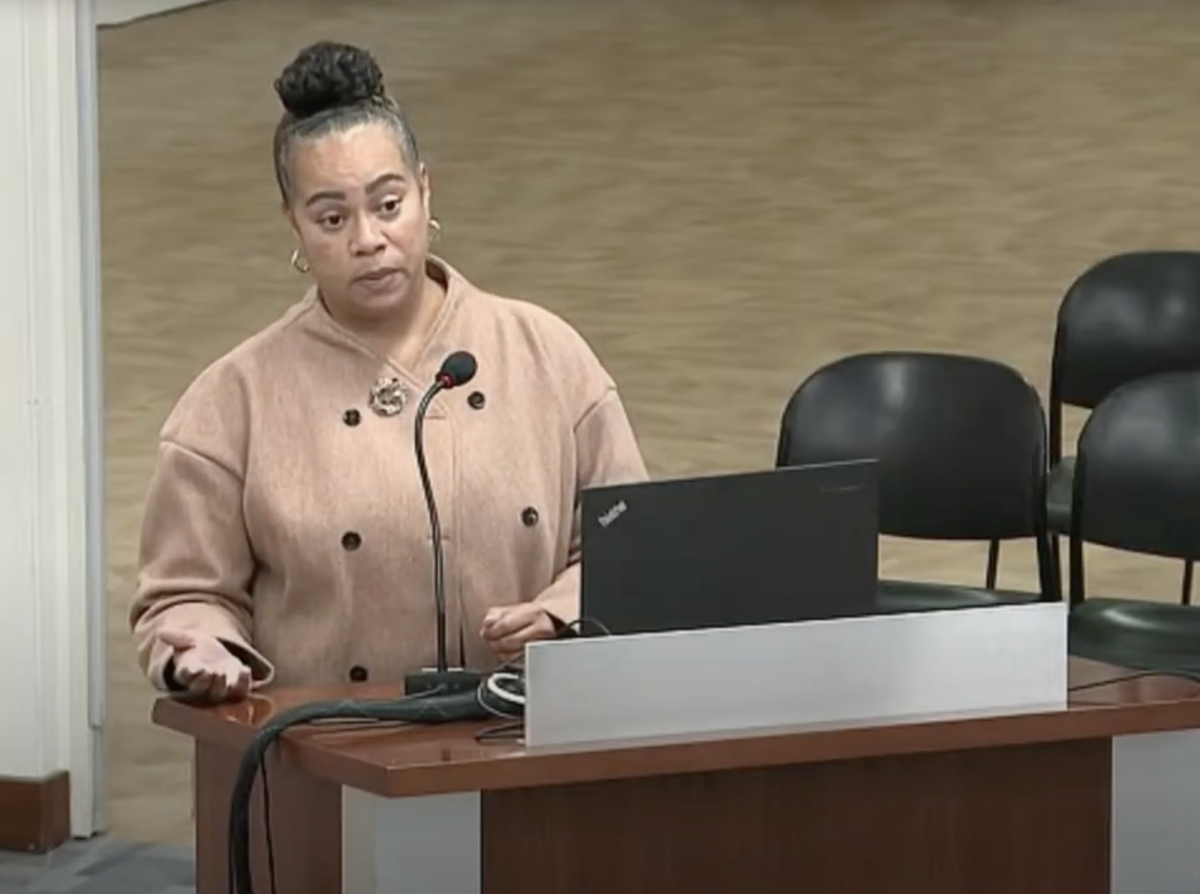Following Peralta Community College District’s January 25 Board of Trustee Meeting, district officials backtracked how and why an agenda item concerning an estimated $11,000 in out-of-state travel for two district administrators, which included $6,576 in first-class airfare, was ultimately approved.
The agenda item, which included travel request forms for Interim Vice Chancellor of Finance Adil Ahmed and Interim Executive Fiscal Director Marla Williams-Powell, showed that the district administrators are scheduled to attend an upcoming conference for the National Association of Student Financial Aid Administration in Washington D.C from February 13-17.
The request forms, which totalled an estimated cost of $11,354, included “estimate [sic] airfare” for two first-class round trip tickets with a price tag of $3,288 each. According to the paperwork, the District was asking for approval for Ahmed and Williams-Powell’s registration, rental cars, hotel rooms and daily incidentals in addition to airfare.
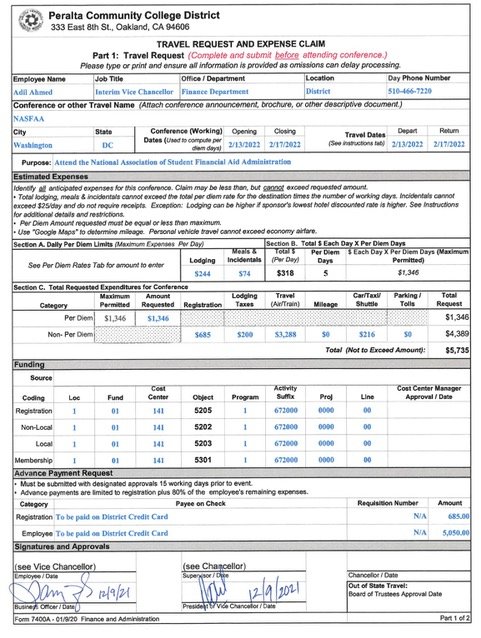
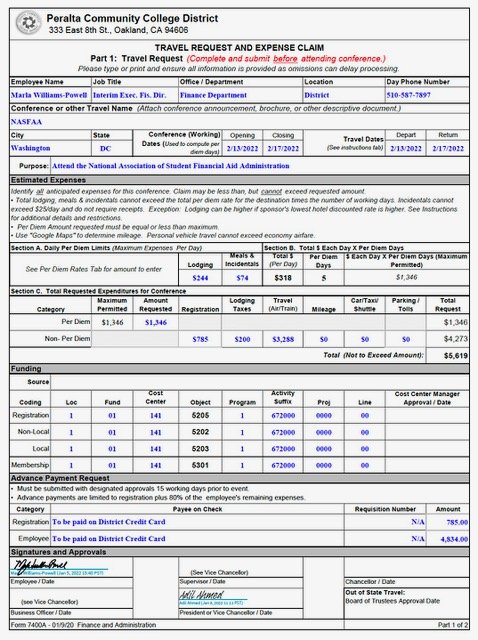
When applying for travel funds, District employees are supposed to adhere to an administrative procedure that lays out the process and guidelines concerning travel authorization, which ultimately comes to the Board of Trustees for approval when it is out of state. According to Education Code Section 87302 Administrative Procedure 7400, “fares must be at the lowest possible rate, e.g., economy, coach, etc. Upgrades are not reimbursable.”
During the January 25 Board of Trustees meeting, Trustee Kevin Jenkins pulled the item for discussion and further investigation, raising concerns about adherence to administrative procedure, and asking if the item was in violation of district policy because of the first-class airfare listed on the paperwork.
The item was on the consent calendar – a grouping of items set for approval at the same time – before it was pulled for further explanation. Although the travel request packets were intended for both Ahmed and Williams-Powell, they were identical.
Jenkins asked Interim Chancellor Jannett Jackson for clarification.
“What we do when we do our travel and conferences, we put the estimated cost, and if anyone wants to upgrade, then they are not reimbursed,” Jackson explained, adding that “when people come back we look at receipts and compare that to what our policies indicate.”
A stipulation in AP 7400 aligns with Jackon’s remarks and states, “If an employee wishes to upgrade, it is done at the employee’s expense”.
After the brief discussion, the Board voted unanimously to approve the total amount requested, including the “estimate [sic] airfare” of $6,576 for the two administrators.
Both travel forms requested approval for the full estimated first-class flight of $3,288, not reflecting the “upgrade” part of that cost that should not be reimbursed by the PCCD.
The Chancellor’s remarks also suggested that there is a post-travel audit that reviews receipts and determines whether expenses will be reimbursed.
However, both forms request “Advance Payment” and list that 80 percent of the expenses will be paid by “District Credit Card”, rather than an approval for reimbursement after the fact.
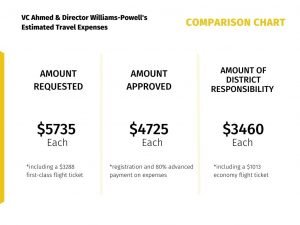
Mark Johnson, PCCD’s Executive Director for Marketing, Communications, and Public Relations, responded to the Citizen’s request for comment on January 28 by clarifying that “the first class travel was not approved; the overall estimated costs for travel were approved” during the board meeting.
Johnson added that he is “positive [the employees’] travel will be compliant with district policy. If they do fly first class, they will reimburse the district (if purchased on a company credit card) or will have paid the airline themselves for any cost difference between coach and first class.”
When the Citizen asked Johnson for further clarification, he said that “as many accountants will tell you, it is better to estimate costs high and have the actuals be lower, so the actual spending is within the budget”.
He explained that “with regards to travel, where low estimates can unexpectedly increase before a purchase is made, a high estimate helps avoid the problem of not asking for enough to cover economy and having to go back to the Board to approve a second time for a single trip.”
Johnson also explained that it was an “assistant (classified professional)” from the department of Finance & Administration that originally “researched and submitted the travel estimates using first class for the estimate.”
The Citizen reached out to classified professionals in the district finance office for comment in regards to Johnson’s comments. As of the date of this publication time, however, the Citizen did not receive a response.
In an email to the Citizen received on January 31, Johnson backtracked his original statement about choosing high estimates to prevent the actual costs from exceeding the approved budget.
“As I wrote last week. the first-class airfare estimate that was circled and used for estimating travel costs for board approval was a clerical error, a simple mistake that made it into the January 25th board meeting materials,” Johnson said.
Johnson also reiterated that “the actual airfare costs are far less and fully compliant with AP 7400”.
Johnson provided images of the tickets purchased by the two administrators.
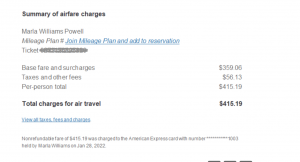
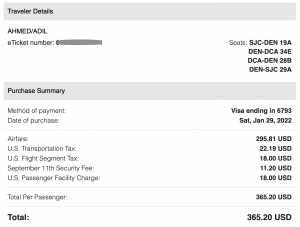
On January 28, the same day that the Citizen initiated communications with Johnson, printouts show that Interim Executive Fiscal Director Williams-Powell purchased round trip tickets for the conference for $415.19. On January 29, Interim Vice Chancellor of Finance Ahmed purchased round trip tickets that totaled $365.20.




